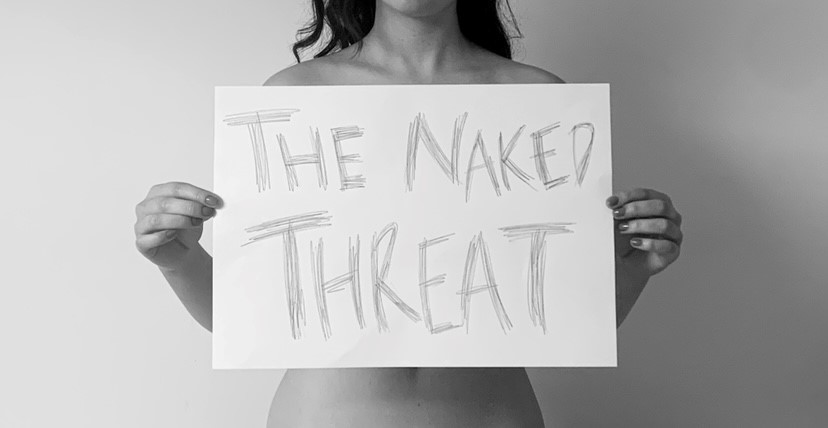Image: The Naked Threat. Credit: Lydia Kerin
After a relentless ‘Naked Threat’ campaign headed by Refuge, the UK government announced it would amend the Domestic Abuse Bill to explicitly criminalise the threat to share sexual photos or films without consent.
The bill will become law later this year and the crime will be punishable by up to two years in prison.
The announcement has been celebrated as a big win for predominantly – though not exclusively – women in the digital age.
It will protect the 1 in 7 young women (aged 18-34) who Refuge’s research identified as experiencing this form of abusive control and will provide them with the much-needed legal support which is currently lacking.
Threats to share intimate images or videos can have disastrous effects on mental health and emotional wellbeing, causing feelings of fear, anxiety, isolation.
83% of women from Refuge’s research said the threats themselves impacted their mental health or made them feel ashamed or frightened, with over 1 in 10 feeling suicidal.
When discussing Refuge’s campaign, Love Island Star and victim of this abuse, Zara McDermott, on BBC Women’s Hour likened the threat to share as being ‘held hostage to these images’.
‘So many women are held hostage by these images.’
Influencer Zara McDermott and @NickyMorgan01 joined us discuss the @RefugeCharity campaign to get threats to share intimate images made a criminal offence https://t.co/2TXZjWwZeg pic.twitter.com/zCPlAyglYS
— BBC Woman’s Hour (@BBCWomansHour) February 28, 2021
This comparison was also echoed by survivor Laura*, 23, receptionist, from Manchester, who said her ex-boyfriend’s threat to share her intimate images made it ‘so hard to leave’.
She remained ‘trapped’ in an abusive relationship for over three years because of the power he exerted over her. She said: “I realised it wasn’t about sex for him, it was about control and power.”

It is important to note this is often the case; Refuge found of those women who experienced threats to share, 72% were threatened by a current or former partner.
Of these women, 83% also experienced other forms of abuse, demonstrating how threats rarely occur in isolation and often form part of a wider pattern of control.
The new legislation will therefore afford victims protection before they experience the trauma of having their intimate photo/video shared.
Significantly, it defines these victims as victims in law. It will raise awareness of the myriad of ways domestic abuse can manifest, remove existing societal stigma and validate the abuse suffered which is not always strictly violent.
There is still much work to be done. A continued emphasis on prevention and protection is needed, along with a cultural shift in the understanding and acceptance of sexting and the sharing of intimate photographs between partners to ensure this law has its full impact.
Both as a result of a lack of legal protection and the cultural taboo surrounding such images, few men or women report the threat of sharing to the police. Refuge found of those who did, less than 14% felt they received a good response.
In light of the announcement, Refuge now wants social media companies to create more robust systems to report illegal threats made on their platforms and take action, meaning an increase in prosecutions against perpetrators.
We have much further to go, but acknowledging progress in the women’s movement can be encouraging. Domestic abuse was almost wholly invisible in the UK not so long ago; marital rape was only criminalised in the UK in the 1990s.
Each victory for women, therefore, no matter how small, represents progress in the movement towards equality and deserves to be celebrated.
Appreciating progress in the battle for gender equality without embracing complacency is a delicate task, yet on International Women’s Day it is one as poignant as ever.
Help and support can be found on Refuge’s website nationaldahelpline.org.uk, or you can call their Freephone 24-hour National Domestic Abuse Helpline on 0808 2000 247.
*name changed to protect victim’s anonymity.




